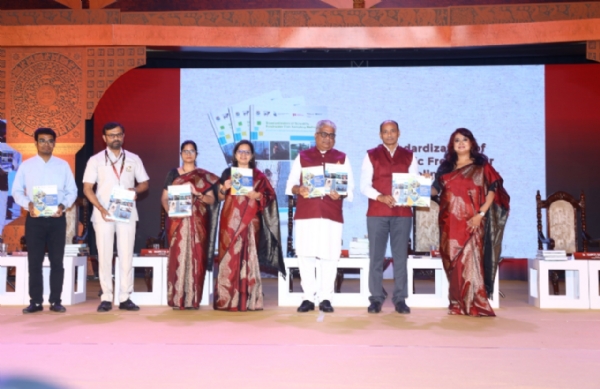
Kolkata, 01 July (H.S.) -
Union Minister for Environment, Forest and Climate Change Bhupender Yadav on Monday announced that a scientific tagging initiative for marine species will soon begin along the coastal areas of West Bengal to aid in their conservation. The announcement was made during the inauguration of the 110th Foundation Day celebrations of the Zoological Survey of India (ZSI) held in Kolkata.
Speaking at the event, the minister said, “The Zoological Survey of India is undertaking a special campaign for the conservation of marine and coastal species. Tagging has already started along Odisha’s coastline, and this initiative will now be extended to West Bengal.”
Yadav highlighted that significant progress has been made in Odisha with the tagging of Olive Ridley turtles, which has enabled detailed monitoring of their migratory patterns and behaviour. Drawing from that success, similar efforts will now be made in Bengal to better understand and protect the region’s marine ecosystem.
Addressing scientists and officials at the event, the minister emphasized the need to further strengthen environmental research in India. He praised the role of the ZSI in documenting and conserving the nation’s biodiversity, describing it as a cornerstone institution in India’s ecological efforts.
As chief guest, Yadav also inaugurated the ‘Animal Taxonomy Summit–2025’, a three-day international summit running from July 1 to 3, which is set to host experts and researchers from across the globe.
A key highlight of the celebration was the conclusion of the “110-hour Hackathon” conducted simultaneously across 16 regional ZSI centres. Aimed at developing innovative solutions to biodiversity conservation and climate change challenges, the hackathon saw participation from several academic institutions. The team from the University of Ladakh, Leh, secured the first prize of ₹1 lakh. St. Anthony’s College, Shillong, won the second prize of ₹75,000, while Fakir Mohan University, Balasore, bagged the third prize worth ₹50,000.
During the ceremony, ZSI Director Dr. Dhriti Banerjee unveiled the “Checklist of Fauna of India Version 2.0”, which documents a total of 1,05,244 species and subspecies. The checklist reflects the highest diversity among insects, with fish dominating the vertebrate category.
Minister Yadav also released the annual report titled Animal Discoveries 2024, detailing the identification of 683 new animal species across India. Kerala topped the list with 101 new species, followed by Karnataka (82), Arunachal Pradesh (72), Tamil Nadu (63), and West Bengal (56). Additionally, the Plant Discoveries 2024 report was released, documenting 410 newly discovered plant species.
In a significant development, a Memorandum of Understanding (MoU) was signed with the Indian Army’s Counter Insurgency and Jungle Warfare School for research on medicinal and edible species in the Himalayan region. Another MoU was signed with the International Union for Conservation of Nature (IUCN) to develop a national red list of Indian flora and fauna.
The celebration also featured a national workshop on the role of traditional knowledge in wildlife conservation, which included six keynote lectures and an open discussion session.
The event concluded with a cultural performance focusing on environmental themes, reflecting the ZSI’s commitment to public awareness. Over the course of the three-day Animal Taxonomy Summit, more than 500 delegates from India and five other countries are expected to participate in discussions on taxonomy, systematics, and biodiversity conservation.
Hindusthan Samachar / Satya Prakash Singh





